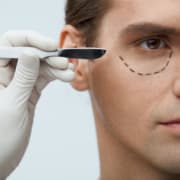How to Recover Well from Eyelid Rejuvenation Surgery
We call the eyes the windows to the soul, but this is somewhat cliché. What our eyes really do is display our state of mind. They express our emotions and they present us to the world around us. When age diminishes the firmness of the delicate tissue around the eyes, we may begin to notice puffiness or heaviness. Eyelid rejuvenation surgery is a popular, minimally-invasive procedure that can correct these issues and more. As a result of blepharoplasty, adults of all ages can regain a sense of satisfaction with their appearance, and a sense of confidence that their appearance accurately reflects who they are. The blepharoplasty procedure is performed on an outpatient basis. There is no overnight stay in the hospital. Most procedures can be performed in the office with local anesthesia rather than general anesthesia, which can lessen the side effects during recovery. Still, patients should know how to maximize their healing process. We’ll discuss that here.
Preparing for Your Blepharoplasty Recovery
An integral aspect of any surgical recovery is preparedness. To be prepared means to have all current projects wrapped up or satisfactorily postponed. It also means being emotionally prepared for downtime. In this day and age of busy living, downtime after blepharoplasty, in particular, can be a challenge. To prepare, patients are encouraged to have all work projects completed so there is no temptation to work during the recovery period. It is also helpful to arrange for some help around the house and to make meals ahead of time that can be heated without much effort.
Self-Care After Blepharoplasty
It takes 10 to 14 days to recover from eyelid rejuvenation surgery. During this time, patients might encounter a couple of potentially-frustrating side effects. One is physical and one is emotional. First, patients should prepare for their appearance after eyelid surgery. Recovery is not particularly painful. Over-the-counter medication can usually manage discomfort quite well. The issue that could create stress is the appearance of the skin around the eyes. Patients are encouraged to remain positive, knowing that swelling and bruising are temporary, and focusing on the correction of bags, heaviness, or other concerns. The other aspect of recovery is emotional; it is the risk of boredom or loneliness.
We live a pretty fast-paced life. Because we’re accustomed to it, we don’t realize how much we “need” to be busy until that busy-ness has been taken away. Blepharoplasty is eyelid surgery. During recovery, the eyes can become fatigued quickly, and the objective in healing is to allow rest. To rest the eyes means to avoid most activities that involve ocular focus. For about a week, patients should avoid watching television, reading, scrolling on social media, reading and answering emails, and writing. That is a lot to avoid when we are so used to these tasks. As an alternative, blepharoplasty recovery can be spent walking outdoors (short distances and always with sunglasses) or listening to audiobooks, podcasts, and music.
Eyelid rejuvenation can be a rewarding decision. After a brief recovery, the effects of surgery can last indefinitely. To learn more, contact our office near San Jose at (408) 559-4700.



